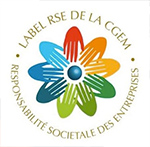LabelVie Group has made social commitment one of its priorities. Aware that its activities must produce a positive impact for all its stakeholders, the Group is particularly attentive to meeting their growing expectations.
The social responsibility approach is a strategic lever for fostering long-term relationships of trust with all stakeholders. It not only helps to improve economic, social and environmental performance, but also to strengthen employee motivation and attract talent.
In 2020, LabelVie Group obtains the CGEM’s CRS Label

LabelVie Group announces that it has been awarded the Corporate Social Responsibility Label by the CGEM and becomes the first major retailer in Morocco to be awarded the label
A commitment at all levels of the company
Our Group’s ambition is to become the reference player in CSR in the retail sector in Morocco.
This CSR approach is structured around several priority actions that have been defined according to the expectations of stakeholders, the impact on the Group’s activities and the outlook. It is steered at the highest level by the Executive Committee and is deployed at all levels.
Our social responsibility policy is based on 5 axes:
To build our CSR policy, we have analyzed and defined the challenges of our activity while taking into account the expectations of all our stakeholders, the specificities of our businesses and our entire value chain:
- Compliance of employees’ working conditions and social policy with the requirements of the labor code and internal values.
- Strict compliance with hygiene and product quality standards and their full compliance with those of the competent health authorities.
- Safeguarding the environment and including nearby communities when setting up stores and logistics platforms.
- Ethical and transparent practices towards all partners, both financial and commercial, in order to anticipate risks, particularly the risk of LabelVie Group’s reputation.
- Traceability of decision-making processes and the reliability of information communicated to stakeholders. Thanks to several exchange and evaluation tools (barometers, questionnaires, workshops, etc.), the company’s various stakeholders can exchange information on current projects and evaluate their relevance and performance. These reports allow the CSR project management team to adjust their expectations and set new objectives.
